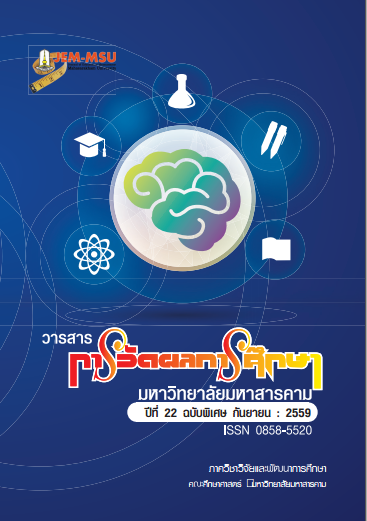The Comparison of Using the Project Approach and CIPPA Model on Learning Achievements, Science Process Skills and Scientific Problem Solving about “Life of the Plant”of Prathomsuksa 4 Students
Main Article Content
Abstract
Science was the fundamental of developing the human thinking process, those
effected to create the abilities and skills of the students investigation and problem
solving systematically and effective teaching model must allow the learner to learn
by experiencing and doing activities in order to develop Science process skill. Therefore
it was necessary to organize of scientific learning more appropriate and compatible
with nature of knowledge. The purposes of this study were 1) to develop the learning
organization using the Project approach and the CIPPA model approach with a required
efficiency of 75/75 2) to compare pretest and posttest on learning achievements, basic
science process skills and scientific c problem solving of Prathomsuksa 4 students who
learned using the Project approach and the CIPPA model approach 3) to compare the
effects of learning achievements, basic science process skills and scientific problem
solving of Prathomsuksa 4 students who learned using the Project approach and the
CIPPA model approach. The sample consisted of 45 Prathomsuksa 4 students studying
at Bantakon School, Muangchan District, Sisaket Province under the Sisaket Primary
Educational Service Area office 2 in the second semester of the academic year 2012.
They were randomly selected by the cluster random sampling technique. The study
instruments were 1) 18 Lesson Plans of Project approach and 18 lesson plans of the
CIPPA model approach about Life of the Plant 18 hours each. 2) a forty items
multiple-choices test on achievement with discriminating ranging 0.32 to 0.94 and a
reliability of 0.79 3) a twenty items multiple-choices test on basic science process
skill with difficulties ranging 0.63 to 0.88, discriminating ranging 0.25 to 0.63 and a reliability
of 0.78 4) a twenty items multiple-choices test on scientific problem solving , difficulties
ranging 0.56 to 0.86, discriminating anging 0.27 to 0.48 and a reliability of 0.82. The
statistics used for analyzing data were percentage, mean , a standard deviation and for
testing hypotheses the t-test (Dependent Samples) and Hotelling’s T2 were employed
The results of the study were as follows :
1. The learning organization using the Project approach had efficiencies of
84.22/82.72 and the CIPPA model approach had efficiencies of 78.03 /77.95
2. The learning achievement, basic science process skills and solving
scientific problems of the students who learned using the Project approach and the
CIPPA model approach were positively at 0.01 level of significance.
3. The students who learned using the Project approach showed gains in
learning achievement, basic science process skill and solving scientific problems more
than the students who learned using the CIPPA model approach.
Article Details
The content and information contained in the published article in the Journal of Educational Measurement Mahasarakham University represent the opinions and responsibilities of the authors directly. The editorial board of the journal is not necessarily in agreement with or responsible for any of the content.
The articles, data, content, images, etc. that have been published in the Journal of Educational Measurement Mahasarakham University are copyrighted by the journal. If any individual or organization wishes to reproduce or perform any actions involving the entirety or any part of the content, they must obtain written permission from the Journal of Educational Measurement Mahasarakham University.


